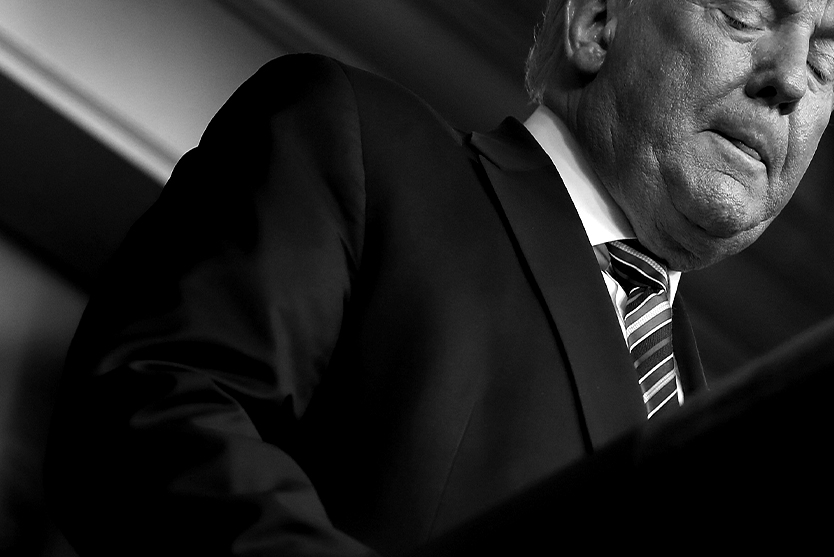Trump signals defeat


A free daily email with the biggest news stories of the day – and the best features from TheWeek.com
You are now subscribed
Your newsletter sign-up was successful
On Thursday evening Donald Trump spoke from the White House on the state of the presidential election. Nothing he said gave the impression that he is preparing to concede to Joe Biden, but his actual words were less important than the manner in which they were delivered.
I have spent goodness knows how many hundreds of hours of my life listening to Trump speak. Gone was the boisterousness and sarcasm to which I and millions are accustomed, and never more in evidence than in his address after midnight on Tuesday. On Thursday, he was dejected, world weary, and almost resigned. He has never sounded like this before. The mojo is gone.
Occasionally Trump strayed into incoherence more typical of his opponent. "I've watched a lot of elections before they decided on this big election," he said, leaving millions of us wondering about the referent of the pronoun.
The Week
Escape your echo chamber. Get the facts behind the news, plus analysis from multiple perspectives.

Sign up for The Week's Free Newsletters
From our morning news briefing to a weekly Good News Newsletter, get the best of The Week delivered directly to your inbox.
From our morning news briefing to a weekly Good News Newsletter, get the best of The Week delivered directly to your inbox.
In summarizing his concerns and those of his supporters — about social media, inaccurate pre-election polling, precinct-level shenanigans — he made it clear that he does not expect to win 270 electoral votes, at least not straightforwardly. Instead of narrow last-minute victories in Pennsylvania, he awaits deliverance at the hands of the Supreme Court. It is unclear exactly what legal remedy he believes is forthcoming.
For the first time in modern American history an incumbent has insisted that the apparent results of a presidential election should be discounted. He has done so on the basis of inchoate feelings rather than the sort of hard evidence that would be admissible in any court. For all that, it is hard to escape the feeling that roughly half of the country agrees with him.
A free daily email with the biggest news stories of the day – and the best features from TheWeek.com
Matthew Walther is a national correspondent at The Week. His work has also appeared in First Things, The Spectator of London, The Catholic Herald, National Review, and other publications. He is currently writing a biography of the Rev. Montague Summers. He is also a Robert Novak Journalism Fellow.
-
 The broken water companies failing England and Wales
The broken water companies failing England and WalesExplainer With rising bills, deteriorating river health and a lack of investment, regulators face an uphill battle to stabilise the industry
-
 A thrilling foodie city in northern Japan
A thrilling foodie city in northern JapanThe Week Recommends The food scene here is ‘unspoilt’ and ‘fun’
-
 Are AI bots conspiring against us?
Are AI bots conspiring against us?Talking Point Moltbook, the AI social network where humans are banned, may be the tip of the iceberg
-
 Epstein files topple law CEO, roil UK government
Epstein files topple law CEO, roil UK governmentSpeed Read Peter Mandelson, Britain’s former ambassador to the US, is caught up in the scandal
-
 Iran and US prepare to meet after skirmishes
Iran and US prepare to meet after skirmishesSpeed Read The incident comes amid heightened tensions in the Middle East
-
 Israel retrieves final hostage’s body from Gaza
Israel retrieves final hostage’s body from GazaSpeed Read The 24-year-old police officer was killed during the initial Hamas attack
-
 China’s Xi targets top general in growing purge
China’s Xi targets top general in growing purgeSpeed Read Zhang Youxia is being investigated over ‘grave violations’ of the law
-
 Panama and Canada are negotiating over a crucial copper mine
Panama and Canada are negotiating over a crucial copper mineIn the Spotlight Panama is set to make a final decision on the mine this summer
-
 Why Greenland’s natural resources are nearly impossible to mine
Why Greenland’s natural resources are nearly impossible to mineThe Explainer The country’s natural landscape makes the task extremely difficult
-
 Iran cuts internet as protests escalate
Iran cuts internet as protests escalateSpeed Reada Government buildings across the country have been set on fire
-
 US nabs ‘shadow’ tanker claimed by Russia
US nabs ‘shadow’ tanker claimed by RussiaSpeed Read The ship was one of two vessels seized by the US military
